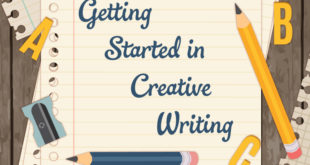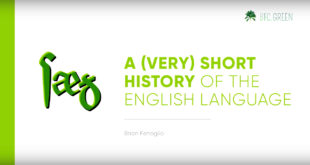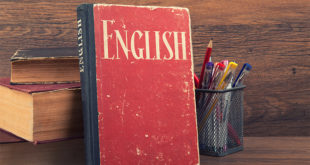“Without language, we find ourselves living in a state of emotional chaos. Our brain has given us the potential to communicate in extraordinary ways and the way we choose to do so can improve the neural functioning of the brain. In fact, a single word has the power to influence the expression of genes that regulate physical and emotional stress. …
Read More »Word Play
Getting Started in Creative Writing
Brian delivers a short presentation with tips and techniques for developing your own creative writing and making your writing something unique to you and your personality. Useful links:
Read More »A (Very) Short History of the English Language
Brian gives an overview of how English developed from a relatively obscure Germanic language to the global language we know today and will give some insight into why English has some of the oddities it does in spelling and pronunciation. Watch the recording of the Online Coaching & Sharing meeting that took place on Thursday, February 23.
Read More »365 Creative Writing Prompts
Not sure what to write? Check out this list of 365 creative writing prompts to get you going. A great way to get you writing about something different every day! Outside the Window: What’s the weather outside your window doing right now? If that’s not inspiring, what’s the weather like somewhere you wish you could be? The Unrequited love poem: How …
Read More »Discover Your Writing Voice
You may be wondering to yourself: what is a ‘voice’ in writing? Much like with your actual voice, a writing voice is something this is unique to you. It makes your writing distinct and recognizable to others when they see it. And once you develop your voice, it will make all your writing more interesting and personal. But finding your …
Read More »The Mother Tongue – English and How It Got that Way by Bill Bryson
Have you ever wondered about English and why it is the way it is? Why we spell “colonel” but say “kərnl”? The Mother Tongue – English and How It Got that Way brilliantly explores the remarkable history, eccentricities, resilience and fun of the English language. A must-read for anyone curious to know the fascinating story of an inadequate, second-rate tongue …
Read More »Bryson’s Dictionary for Writers and Editors by Bill Bryson
I love Bill Bryson. And he’s from my home state: Iowa! He has a unique and wonderful writing style. His book Bryson’s Dictionary for Writers and Editors is a useful guide to many problems encountered by writers and editors of English texts. What’s the difference between “immanent” and “imminent”? What is the singular form of graffiti? What is the former …
Read More »Knowing Your Audience
Know Your Audience So you’ve decided you want to write something. What now? Well, before you get started, it’s important to know your audience, to know who you are writing for. Whether it’s a formal letter, a report, a friendly email or the next great poem, you need to know who will be reading your words in order to craft …
Read More » bfc.green Promoting Green Lifestyle
bfc.green Promoting Green Lifestyle







